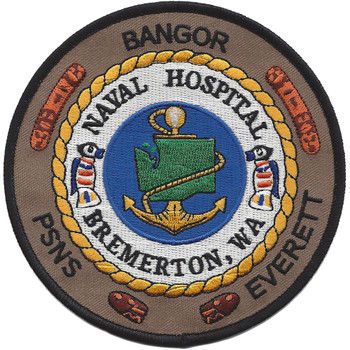Description
Naval Hospital Camp Pendleton California Patch (U.S. Navy) 3.25" x 5.0" Embroidered Patch with Iron-On Backing
Superior Materials: Made with premium polyester thread and durable twill fabric, ensuring long-lasting color and strength.
Advanced Embroidery Technology: Crafted using the most advanced embroidery machinery, guaranteeing intricate detail, sharp lines, and consistent quality every time.
Easy Iron-On Application: Features a heat-activated adhesive backing for quick, no-sew attachment. Simply position, iron, and press for a secure bond.
Versatile Use: Perfect for personalizing jackets, backpacks, uniforms, or any fabric surface that needs a touch of personality.
Durable and Washable: Designed to withstand everyday wear and occasional washing without fading or fraying.
Formations & Origins
Naval Hospital Camp Pendleton, located within the sprawling Marine Corps Base Camp Pendleton in Southern California, was established to provide comprehensive medical care to Marines, sailors, and their families stationed at one of the largest Marine Corps bases in the United States. The hospital’s origins trace back to World War II when the need for a dedicated, full-service medical facility on the West Coast became critical to support the vast numbers of troops preparing for deployment to the Pacific Theater. Since then, it has grown into a modern medical center capable of delivering a wide range of healthcare services.
Notable Commanders
The hospital’s leadership traditionally includes highly experienced Navy medical officers, many with backgrounds in combat medicine, trauma care, and hospital administration. These commanders have overseen the evolution of the facility through periods of war, peace, and peacetime readiness, ensuring the hospital can meet the physical and mental health needs of a diverse military population. Their leadership has emphasized innovation in medical practices, swift response to combat casualties, and community health support.
Major Campaigns/Operations
Though a medical facility rather than a combat unit, Naval Hospital Camp Pendleton has played an indirect but vital role in multiple U.S. military campaigns. It has provided treatment and rehabilitation for casualties from conflicts such as the Vietnam War, Gulf War, Iraq War, and Afghanistan. The hospital has also been a critical hub during humanitarian missions and natural disaster responses, offering medical aid and support to military personnel deployed worldwide. Its role in training medical personnel to operate in combat zones has also been pivotal.
Specialized Role/Equipment
Naval Hospital Camp Pendleton is equipped with state-of-the-art medical technology, including surgical suites, intensive care units, trauma centers, rehabilitation facilities, and mental health services. It supports a full spectrum of care from routine outpatient services to emergency treatment for battlefield injuries. The hospital also serves as a training center for Navy corpsmen, medical officers, and nurses, focusing on combat casualty care, preventive medicine, and medical readiness.
Acts of Heroism
The hospital staff, including doctors, nurses, corpsmen, and support personnel, have frequently demonstrated heroic dedication, especially during periods of intense combat operations when the influx of wounded can be overwhelming. Their work saving lives under pressure—often with limited resources and under threat—embodies the Navy’s commitment to “care for those who serve.” Many individuals from the hospital have been recognized for exceptional medical service and compassionate care, helping wounded warriors recover and return to duty or civilian life.
Legacy & Notable Achievements
Naval Hospital Camp Pendleton has a proud legacy as a cornerstone of military medicine on the West Coast. Its patch symbolizes a commitment to healing, readiness, and support for the fighting forces. Over decades, the hospital has evolved into a premier military medical center that not only saves lives but advances medical science and combat care practices. It continues to serve as a critical lifeline for service members and their families, standing ready to respond to the ever-changing demands of modern military service.






